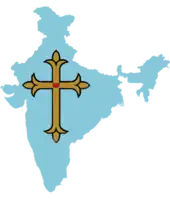Mariam Thresia Chiramel
Mariam Thresia (born Thresia Chiramel Mankidiyan; 26 April 1876 – 8 June 1926) was an Indian Syro-Malabar Catholic professed religious and the founder of the Congregation of the Holy Family.[1] Thresia Mankidiyan became known for receiving frequent visions and ecstasies as well as even receiving the stigmata which she kept well-guarded. She had been involved in apostolic work her entire life and pushed for strict adherence to the rule of her order amongst her fellow religious.[2][3]
 Tomb of St. Mariam Thresia | |
| Religious; Mystic | |
| Born | 26 April 1876 Puthenchira, Thrissur District, Kerala, India |
| Died | 8 June 1926 (aged 50) Kuzhikattussery, Thrissur District, India. |
| Venerated in | Catholic Church especially |
| Beatified | 9 April 2000, Saint Peter's Square, Vatican City by Pope John Paul II |
| Canonized | 13 October 2019, Saint Peter's Square, Vatican City by Pope Francis |
| Major shrine | Puthenchira, India |
| Feast | 8 June, 26 April at St Mary's Forane Puthenchira |
| Attributes | Religious habit |
| Patronage | Congregation of the Holy Family |
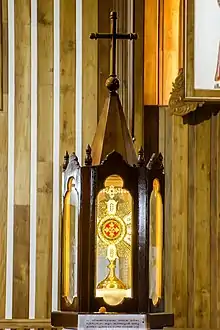
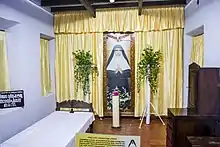
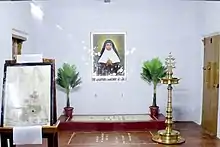
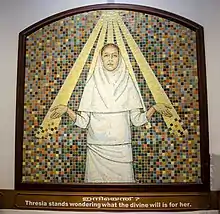
Pope John Paul II beatified the late nun on 9 April 2000. Pope Francis approved a second miracle attributed to her at the beginning of 2019 and she was canonized on 13 October 2019.
Life
Thresia Chiramel Mankidiyan was born in Puthenchira in Irinjalakuda Revenue Division of Thrissur district on 26 April 1876 as the third of five children of Thoma and Thanda and was later baptized on 3 May 1876 at the church of Saint Mary; she was named in honor of Teresa of Ávila. Her paternal uncle Antony Chiramel Mankidiyan was her godfather and his wife Anna was the godmother. Her family was once rich though became poor when her grandfather married off seven daughters after selling property for each costly dowry; this led to her brothers and her father taking up drinking.[2] Her mother was her father's second wife; her father's first wife Mariamkutty died during childbirth in 1872.[3] She had two sisters and two brothers and were in exact order: Porinchu, Mariamkutty, Ouseph and Ittianam – she was born in between Mariamkutty and Ouseph.
In 1884 her mother tried in vain to dissuade the pious girl from her severe fasts and night vigils. Her mother died on 2 March 1888 after blessing her children who gathered at her deathbed. Her mother's death marked the conclusion of her studies and she instead dedicated herself to contemplation in her local parish church. She made a private vow to remain chaste in 1886.[1] In 1891 she hatched a scheme to sneak from home to lead a life of penance in the hills but soon decided against this and instead returned home. Since 1904 she desired to be called "Mariam" under the belief she had a vision from the Blessed Virgin Mary in which she was instructed to add it to her name.[2] From 1902 to 1905 she was subjected to several exorcisms from Venerable Joseph Vithayathil – under the orders of the local bishop – and from 1902 it was Vithayathil who became her spiritual director until her death.
In 1903 she requested Mar John Menachery – the Archbishop of Thrissur – to build a house of retreat but it was turned down. This happened after she had formed a group with three other friends and engaged in apostolic work with poor families.[1] Menachery instead suggested she make an effort to join a religious congregation and encouraged her to join the new Congregation of the Franciscan Clarists but left since she didn't feel called to it. Mankidiyan later accepted the John Menachery's request in 1912 to join the Carmelites at Ollur and was there since 26 November 1912 until she left on 27 January 1913 because she did not feel drawn to them either. In 1913 she set up a house at Puthenchira and on 14 May 1914 founded the Congregation of the Holy Family to which she was professed in and vested in its habit; she was the first superior of the order.
Stigmata
She was said to have had a range of spiritual experiences such as receiving the stigmata and hid this from public view; she first had this in 1905 though became more visible on 27 January 1909.[2] She also purportedly suffered a series of demonic attacks.
In 1926 a falling object struck her on the leg and the wound soon festered. Mankidiyan was admitted to the local hospital though doctors deemed her condition fatal and she was moved by bullock cart back to her convent where on 7 June 1926 she received the final sacraments and the Viaticum.[3]
Death
She died at 10 pm on 8 June 1926 from her leg wound that her diabetes exacerbated.[2] Her final words were: "Jesus, Mary and Joseph; I give you my heart and my soul" – she then closed her eyes and died.[3] On the morning of her death she was laid on the floor on a mat at her request with her spiritual director and fellow religious huddled around her. Her funeral was celebrated on 9 June and in accordance with her wishes her remains were not washed prior to her funeral.
Canonization
The beatification process opened in Irinjalakuda on 12 July 1982 after the Congregation for the Causes of Saints (C.C.S.) titled her as a Servant of God and issued the official "nihil obstat" (nothing against) to the cause while the cognitional process opened on 14 May 1983 and concluded its business on 24 September 1983; the C.C.S. later validated the process after its conclusion in Rome on 8 November 1985 and received the Positio dossier from the postulation a decade later in 1997.
The board of historians met to assess the cause and to determine if historical obstacles existed before issuing their approval for the cause on 27 May 1997 at which point the theologians approved it on 9 October 1998 as did the C.C.S. on 19 April 1999. Pope John Paul II named the late religious as Venerable on 28 June 1999 after he confirmed that she had lived a life of heroic virtue. The investigation of the miracle required for beatification was held in the Trissur eparchy from 28 April 1992 to 26 July 1993 and was validated on 22 January 1999 before receiving the approval of the medical board on 16 November 1999. Theologians then voiced their own approval on 5 January 2000 . The miracle was that of the cure of one Mathew D. Pellissery, who was born in 1956 with congenital club feet. He could barely walk with great difficulty on the sides of his feet until he was fourteen. After 33 days of fasting and prayer by the whole family, invoking the help of Mariam Thresia, his right foot was straightened during sleep on the night of 21 August 1970. Similarly after 39 days of fasting and prayer his left foot was also straightened overnight during sleep on 28 August 1971. Since then, Mathew has been able to walk normally. This double healing was declared inexplicable in terms of medical science by as many as nine doctors in India and Italy and thus met the last canonical requirement for her beatification. It was declared a miracle obtained through the intercession of Mariam Thresia by the C.C.S. on 18 January 2000 before the Pope himself issued final approval on it on 27 January 2000. John Paul II beatified Mariam Thresia on 9 April 2000 in Saint Peter's Square. Mathew Pellissery was present there during the beatification ceremony at St. Peter's Square.[2]
The second miracle – and the one needed for her canonization – was investigated in the diocese of its origin and later received the formal validation of the C.C.S. in Rome on 24 June 2014. The miraculous healing of the child Christopher received approval from the medical board in Rome in March 2018 and theologians later confirmed it in October 2018. Pope Francis approved this miracle on 12 February 2019 which cleared her for canonization; it was celebrated on 13 October 2019.[4]
The postulator for this cause was the Jesuit priest George Nedungatt.
Media
Vaazhthappetta Mariam Thresia: Kudumbangalude Madhyastha directed by Sibi Yogyaveedan on Shalom won the award for the best teleserial at Kerala State television awards for 2013.[5]
References
- "Blessed Mariam Thresia Mankidiyan". Saints SQPN. 4 June 2016. Retrieved 11 October 2016.
- "Mariam Thresia Chiramel Mankidiyan (1876–1926)". Holy See. Retrieved 11 October 2016.
- "A Timeline of Bl. Mariam Thresia". Bl. Mariam Thresia. Retrieved 11 October 2016.
- "Pope to canonize Newman and four others on 13 October - Vatican News". www.vaticannews.va. 1 July 2019. Retrieved 17 October 2019.
- "State television awards announced – The Hindu". Thehindu.com. Retrieved 27 December 2017.
External links
- Official website
- History Puthenchira
- Video on YouTube
- Hagiography Circle
- Saints SQPN
- Holy See
- Santi e Beati
- Sunil Villwamangalath: സ്വന്തം പുത്തന്ചിറ ചരിത്രവഴികളിലൂടെ, Dec. 2014 (Book in Malayalam on the history of Puthenchira, village of St. Mariam Thresia).
